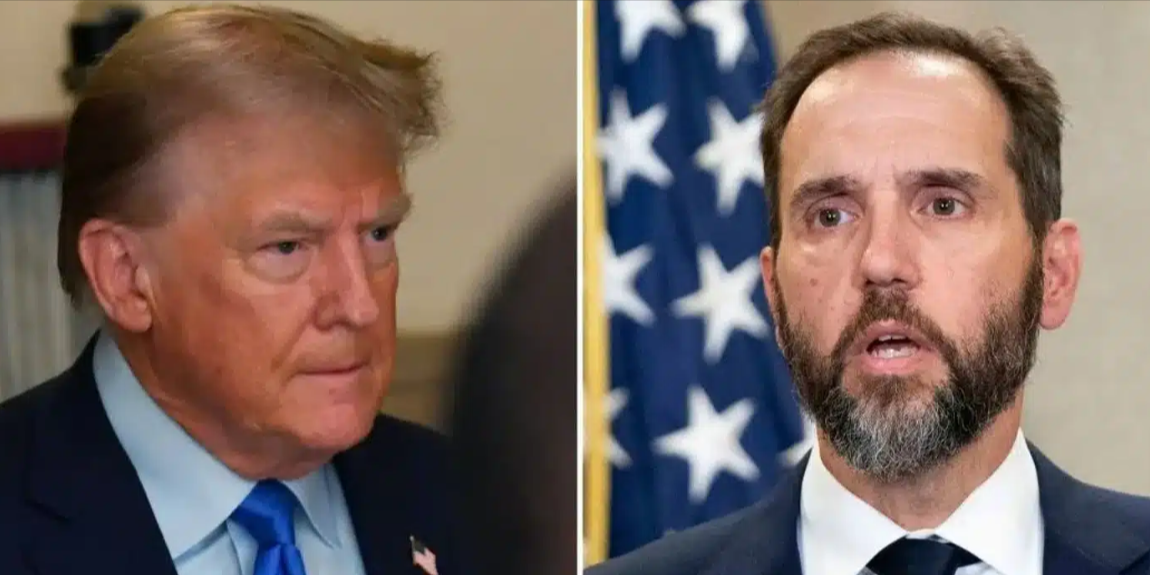Justice Dept. Fires Career Prosecutors On Jack Smith’s Team For Lack of ‘Trust’

The interim head of the Justice Department has dismissed over a dozen officials and career attorneys who had collaborated with former special counsel Jack Smith in bringing charges against President Donald Trump. These legal actions spanned more than a year leading up to Trump’s electoral victory over Vice President Kamala Harris in November.
Fox News Digital initially reported that Acting Attorney General James McHenry sent letters to the prosecutors, informing them of their dismissal due to concerns that they could not be trusted to "faithfully implement the president’s agenda."
A DOJ official confirmed to Fox that McHenry had sent the termination notices via email to each affected individual.
Addressing the issue of trust, a network legal analyst noted in a Tuesday segment that prosecutors working with a special counsel do so voluntarily—none are assigned to the role. This means those involved in such cases often have a vested interest in securing a conviction. The implication is that McHenry believed the dismissed prosecutors harbored bias against Trump and, as a result, could not be depended upon to carry out their duties impartially under his leadership.
Fox reported that the exact number of terminated DOJ prosecutors and officials remains unclear, as a list of names has not been disclosed.
“Today, Acting Attorney General James McHenry terminated the employment of a number of DOJ officials who played a significant role in prosecuting President Trump,” a DOJ official told Fox News. “In light of their actions, the Acting Attorney General does not trust these officials to assist in faithfully implementing the President’s agenda.”
This decision, the official added, "is consistent with the mission of ending the weaponization of government."
The move follows the Justice Department’s earlier reassignment of more than a dozen officials during the first week of the Trump administration to initiatives such as a Sanctuary City task force. It also aligns with President Trump’s broader goal of addressing what he perceives as the misuse of federal authority.
Jack Smith, a longtime Justice Department figure, was appointed as special counsel by former Attorney General Merrick Garland in November 2022.
Previously serving as an assistant U.S. attorney and head of the DOJ’s public integrity section, Smith spearheaded the investigation into Trump’s handling of classified documents post-presidency, as well as potential obstruction of the federal probe into the matter.
Smith also led the inquiry into whether Trump or his associates sought to interfere with the peaceful transition of power following the 2020 election, particularly regarding the certification of Electoral College results on January 6, 2021.
Smith ultimately brought charges against Trump in both cases, though Trump pleaded not guilty.
In July 2024, U.S. District Court Judge Aileen Cannon of the Southern District of Florida dismissed the classified records case, ruling that Smith’s appointment as special counsel was unlawful.
Smith had also indicted Trump in Washington, D.C., over the 2020 election case. However, after Trump was elected president, Smith moved to dismiss the charges, a request that Judge Tanya Chutkan granted.
Separately, a federal judge on Monday lifted restrictions that had previously barred Oath Keepers founder Stewart Rhodes and seven other members from entering Washington, D.C., without court approval. This came after Trump commuted their sentences related to the January 6, 2021, Capitol riot.
U.S. District Judge Amit Mehta, an Obama appointee who oversaw the Oath Keepers’ conspiracy trials, reversed the restriction, stating it would be “improper” to alter their sentences “post-commutation.”
“It is not for this court to divine why President Trump commuted Defendants’ sentences, or to assess whether it was sensible to do so,” Mehta wrote. While he denied the Justice Department’s request to "dismiss" the Oath Keepers’ supervised release terms entirely, he acknowledged that the commutations meant they would no longer be enforced. “The court’s sole task is to determine the act’s effect,” he stated.
“The U.S. Department of Justice’s motion is granted in part and denied in part,” Mehta concluded. “The court will not ‘dismiss’ the non-custodial portion of defendants’ sentences, but defendants are no longer bound by the judicially imposed conditions of supervised release.”